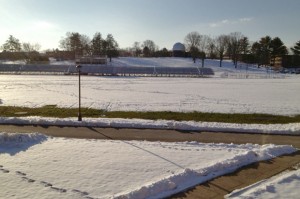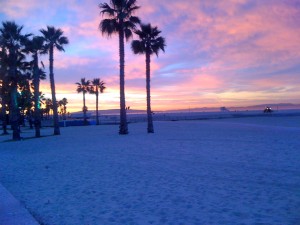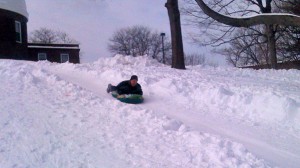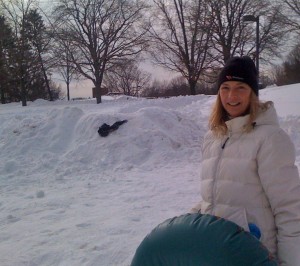This week I met with staff at a convocation for the new semester. We shared the good news that the Old Squash Building has been beautifully reconstructed (on time and on budget!) as the new home for the Career Resource Center, the College of Letters and the Art History department. We also talked about the continued growth in our application pool and the flurry of generous giving that came at the end of the calendar year. The Physical Plant team, the Admissions Office and the University Relations Office have been awfully busy during this long winter “break.”
I shared with the staff some quick thoughts about the re-accreditation process now underway with the Northeast Association of Schools and Colleges. During our self-study, we are asked to assess and reflect on our progress on 11 “standards”. We are using this process to find places where we can improve the university’s operations, and in that spirit I mentioned a challenge for each of NEASC’s standards.
Mission and Purpose
In a joint community effort we created a Mission Statement about two years ago. This is it:
Wesleyan University is dedicated to providing an education in the liberal arts that is characterized by boldness, rigor, and practical idealism. At Wesleyan, distinguished scholar-teachers work closely with students, taking advantage of fluidity among disciplines to explore the world with a variety of tools. The university seeks to build a diverse, energetic community of students, faculty, and staff who think critically and creatively and who value independence of mind and generosity of spirit.
Planning and Evaluation
How do we plan with data? How do we maintain tradition without carrying dead weight?
There are many things we do at Wesleyan because we’ve “always done them this way.” We must use data in order to plan programs that will give maximum support to learning and research.
Organization and Governance
How do we involve faculty and staff in planning for the future of the organization when contemporary needs are so pressing?
We have seriously reduced annual spending and the size of the support staff. This makes day-to-day operations more challenging. In this context it is imperative to involve faculty and staff in planning the long-term future of the university.
Academic Program
How will the liberal arts remain relevant for the future? What is curricular coherence?
In 2007 we were challenged by NEASC to articulate our view of the coherence of the curriculum. We believe that students at Wes should own their own education, but to do so requires serious advising and mentoring. By giving students the tools to develop their own education, we strive to provide intellectual cross-training –liberal learning that will shape the future.
Faculty
How do we support a scholar-teacher model in a world increasingly concerned with immediate results?
We believe that students learn from the example of dedicated scholar-teachers. But much of scholarship is not immediately relevant to the classroom, and we know that deep research is not best judged by popularity. Our challenge is to maintain the subsidy for advanced research as a vehicle for first-rate undergraduate education.
Students
How do we maintain vibrant student life in the face of a culture of entitlement and excessive drug and alcohol use?
Wesleyan has long been known for its progressive, creative and productive student culture. Like most colleges and universities, we also have a student culture plagued by abuse of alcohol and drugs by people who feel that this is “their time” to do whatever they please. How can we balance the forces of creativity and our responsibility to maintain a safe, educational environment?
Library and Info Resources
How do we maintain vibrant up-to-date access to the best information across a wide variety of fields?
The Wesleyan Library is one of the jewels of the campus, and it remains a great study space and intellectual resource. It is also part of a network of resources that connect student and faculty to the materials they need for study. Increasingly, this means access to information rather than ownership of materials.
Financial Resources
How do we rebuild our endowment base while competing right now?
For the last few years we have been focused on building our endowment, so that the financial strength of the university will be at least as great 25 years from now as it is today. We must balance that long-term building with the needs of the students, faculty, and staff today.
Public Disclosure
Can we maintain a culture of transparency in a highly political environment?
Since the financial crisis, we have been making all our financial and planning materials as public as possible. We must continue to do so, even in a context of competition and critique.
Physical Resources
We have a beautiful campus that thousands consider home. It is aging. How do we maintain it and modernize it?
Many say that Wesleyan’s campus has never looked more beautiful, and the new buildings work well side-by-side with our historic structures. We must continue to maintain our history even as we modernize our physical plant to become more energy efficient and networked to the wider world.
Integrity
How can we be honest about our challenges and forthright in our commitments?
I am very proud of the achievements of our university — from staff and faculty members who go far beyond the call of duty to students who achieve focused excellence while broadening their educational experience. I am also proud of the ways that our community prods us to do even more, pointing out where we fall short and encouraging us to live up to our mission to: think critically and creatively and… value independence of mind and generosity of spirit
In a few weeks, new drafts of our accreditation self-study will be posted online. I hope many of you will comment on our work thus far. Together, we will make Wesleyan a university that can be an ever deeper resource for its students, alumni, faculty and staff — a university that can be an admirable example of the best in American progressive liberal arts education.



![photo[7]](https://roth.blogs.wesleyan.edu/files/2014/01/photo7-300x225.jpg)



